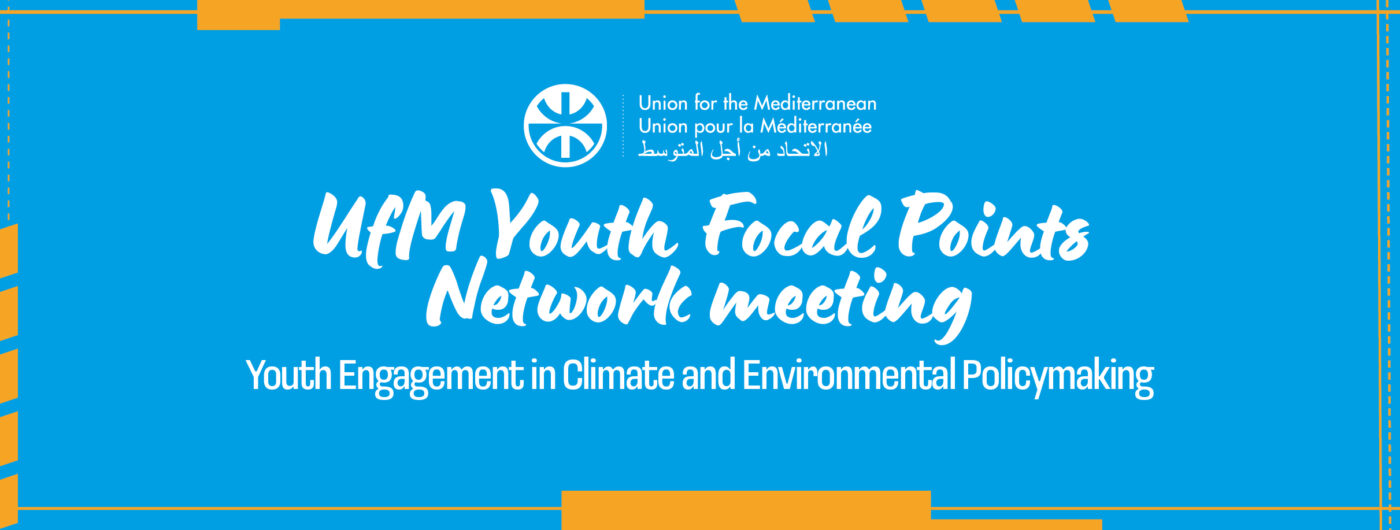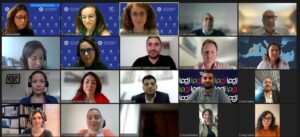
Empowering young voices: UfM launches youth engagement series
22 May 2024, online – In alignment with the priorities set by the UfM Youth Agenda, the Union for the Mediterranean (UfM) is organising a series of three online meetings in 2024 of the UfM Youth Focal Points Network. These virtual gatherings aim to explore how young people from the Mediterranean region can be actively and impactfully involved in policy-making processes related to the three thematic priorities of the UfM Youth Agenda: (i) Climate Action and Environment; (ii) Education and Employment; and (iii) Social Inclusion and Participation.
The inaugural meeting took place online on 22 May, focusing on Youth Engagement in Climate and Environmental Policymaking.
The event was attended by 41 participants, including representatives from the UfM Co-Presidency—Mr Fakhri Altwal from the Ministry of Youth of Jordan and Ms Cristina Casella, Programme Manager for Climate Action at DG NEAR—alongside the UfM National Focal Points on Youth representing UfM Member States, youth-focused Civil Society Organisations (CSOs), and youth experts and activists. Together, they discussed strategies for creating effective, action-driven, intergenerational decision-making processes that empower young people to lead the green transition.
Amb. John Paul Grech, Deputy Secretary General of the UfM Social and Civil Affairs Division, emphasised the importance of youth involvement in addressing climate change in the region: “The urgency of addressing climate change in our region remains of paramount importance, requiring active involvement from youth movements alongside governments and institutions.”
 The meeting featured a series of presentations showcasing concrete initiatives related to the topic. Additionally, participants engaged in two open discussions. The first discussion addressed the challenges, opportunities, and best practices for enhancing youth engagement in the formulation, implementation, and monitoring of climate resilience and environmental sustainability policies in the Mediterranean region. The second discussion focused on strategies to implement effective intergenerational, multi-stakeholder decision-making processes to support the UfM Youth Agenda’s calls for action on Environment and Climate Action.
The meeting featured a series of presentations showcasing concrete initiatives related to the topic. Additionally, participants engaged in two open discussions. The first discussion addressed the challenges, opportunities, and best practices for enhancing youth engagement in the formulation, implementation, and monitoring of climate resilience and environmental sustainability policies in the Mediterranean region. The second discussion focused on strategies to implement effective intergenerational, multi-stakeholder decision-making processes to support the UfM Youth Agenda’s calls for action on Environment and Climate Action.
Participants highlighted the clear need to invest in the sustainability of youth-led initiatives by adopting a budgeting approach that allocates the necessary resources to create tangible impacts. Furthermore, there was a call for increased capacity-building for both young people and decision-makers to facilitate synergies and structure meaningful intergenerational dialogue platforms. Recognising and valuing the skills and expertise that young people already possess, such as in digital technologies, was also deemed crucial for fostering impactful intergenerational dialogue on climate and environmental policies.
The subsequent meetings of the UfM Youth Focal Points Network will take place in June and July 2024. The insights gathered from these sessions will be compiled into a final policy document for UfM stakeholders. This document will be presented at the Med Youth Lab, a capacity-building initiative focused on project development and soft skills, organised by the UfM with support from the German Development Cooperation in November 2024.
More information

